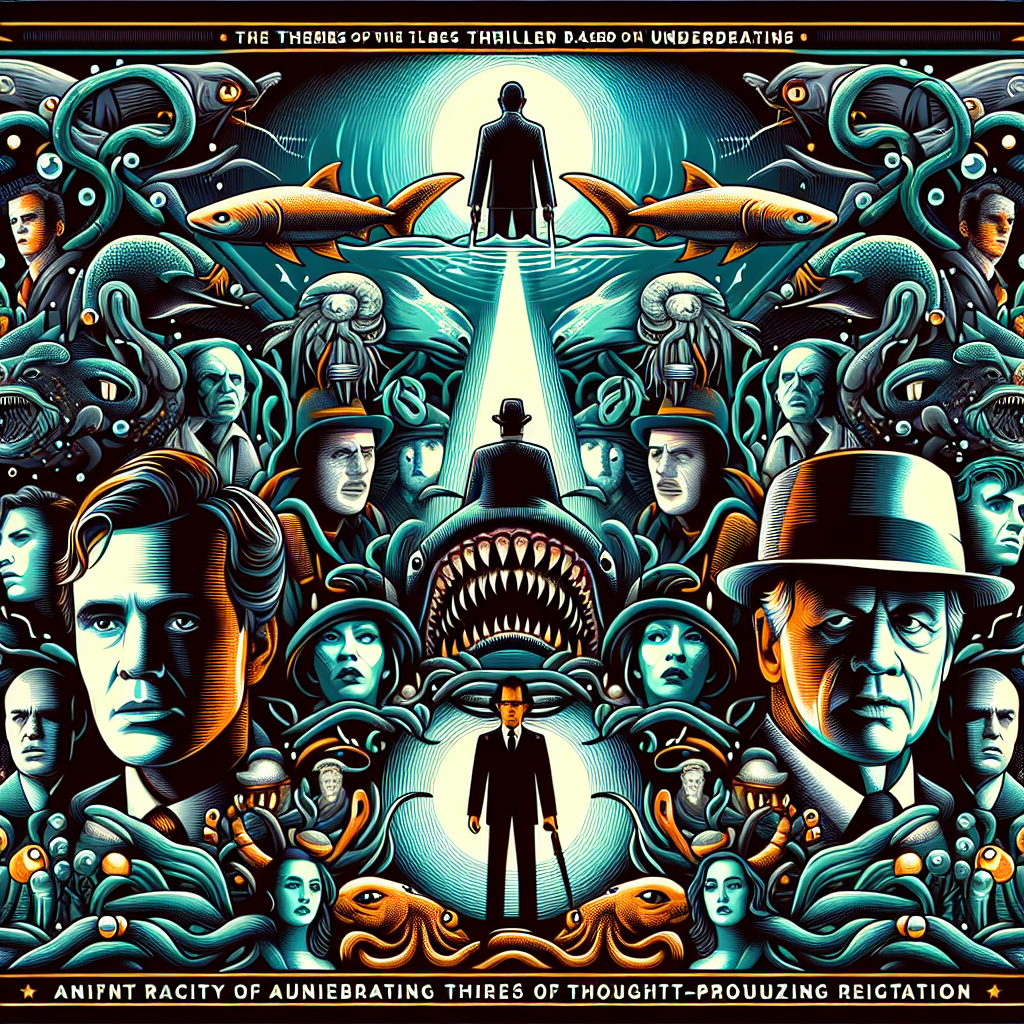Title: Why Jaws (1975) Remains a Timeless Thriller: The Secrets Behind Spielberg’s Masterpiece
Introduction
"Jaws," directed by Steven Spielberg and released in 1975, stands as a monumental achievement in cinema history. It is not merely a film about a man-eating shark terrorizing a small beach town; it is an exemplar of storytelling, character development, and cinematic craftsmanship. Hailed as the first summer blockbuster, "Jaws" shattered box-office records and forged a new path for the film industry. Its significance extends beyond its immediate success, influencing the way movies are marketed, released, and even consumed by audiences.
Thematic Depth
At its core, "Jaws" is a thriller that transcends the simple premise of predator versus prey. It delves into themes of fear, human vulnerability, and communal resilience. The sense of dread is palpable, and Spielberg masterfully builds tension through the unseen menace lurking beneath the water. The shark, though the central antagonist, symbolizes a greater, primal fear—what lies unknown and uncontrollable.
Thematically, "Jaws" explores the natural versus the human-made world, highlighting the fragility of human constructs when faced with nature’s raw power. It also touches upon themes of heroism and personal growth, as embodied by the characters of Chief Brody, Quint, and Hooper, each representing different facets of bravery and vulnerability.
Character Arcs and Development
The film’s characters are richly developed, with each undergoing significant arcs that add layers of depth to the narrative. Chief Martin Brody, portrayed by Roy Scheider, anchors the film with his journey from a frightened lawman to a courageous protector. As the police chief of Amity Island, he faces the town’s disbelief and economic concerns, reflecting a broader commentary on governance, responsibility, and public safety.
Quint, played by Robert Shaw, is the grizzled fisherman whose personal vendetta against sharks stems from a traumatic past. His character embodies the rugged individualism and aggressive masculinity, which eventually leads to his downfall. The USS Indianapolis monologue is a haunting testament to his survivor’s guilt and deep-seated fear, resonating deeply with the audience.
Richard Dreyfuss’s Matt Hooper brings in a contrasting element as the educated and somewhat naive oceanographer. His character represents scientific rationalism and optimism. The dynamic between these three men—Brody’s cautious pragmatism, Quint’s volatile experience, and Hooper’s intellectual curiosity—creates a compelling triangulation that drives the narrative forward.
Cinematic Techniques and Impact
"Jaws" is revered for Spielberg’s innovative cinematic techniques, which have become a study for filmmakers and enthusiasts alike. One of the most notable aspects is the film’s use of the "less is more" approach. Due to mechanical issues with the shark prop, Spielberg employed suggestive horror rather than explicit visuals, thereby amplifying the terror through imagination. The POV shots from the shark’s perspective, combined with John Williams’s iconic, suspenseful score, create an atmosphere of relentless tension.
The editing, done by Verna Fields, is sharp and purposeful, ensuring that the pacing keeps the audience on edge. The choreography of scenes, especially those involving water, demonstrates an incredible level of detail and coordination, which contributes to the film’s sense of realism and immersion.
Cultural, Social, and Historical Reflections
Upon its release, "Jaws" tapped into the cultural psyche of mid-70s America, a time when trust in institutions was waning following events like the Watergate scandal. The film mirrored the anxieties of the era—fear of the unknown, distrust in authority, and the vulnerability of communities.
Moreover, "Jaws" influenced our collective fear of the ocean, creating a lasting impact on how people perceive sharks. Despite some criticism from conservationists for vilifying these creatures, the movie undeniably raised public awareness about sharks, even if through a lens of fear.
Legacy and Influence
"Jaws" set a new precedent for the film industry, inaugurating the era of the summer blockbuster. Its marketing strategies, including the extensive use of TV spots and a wide release, became the blueprint for future big-budget films. The movie’s success demonstrated the viability of high-concept, universally appealing narratives, shaping Hollywood’s production and distribution strategies.
Spielberg’s career was catapulted, establishing him as one of the most influential directors in cinematic history. The film’s influence can be seen in various genres, from thrillers to adventure films, and it has inspired countless homages and parodies.
Reflective Questions and Takeaways
As we consider why "Jaws" remains a timeless thriller, several questions arise:
- How does "Jaws" manage to evoke such enduring fear and suspense without relying on modern CGI and special effects?
- In what ways does the film’s portrayal of community response mirror contemporary societal reactions to crises?
- Can the methods used in "Jaws" to build tension and character depth be effectively applied in today’s cinematic landscape dominated by visual effects?
- What lessons can filmmakers draw from "Jaws" regarding the balance between narrative depth and audience appeal?
"Jaws" encourages us to reflect on the nature of fear and heroism and the power of skilled filmmaking to transcend time. Its relevance today lies not just in its ability to entertain but also in its profound influence on the film industry and popular culture. It challenges us to look beyond the surface, inviting a deeper appreciation for the craft behind the suspense and the human stories interwoven with the terror. Indeed, "Jaws" is more than a movie; it is a timeless study in the art of storytelling.
[Advertisement]
Looking for deeper meaning in your favorite movies? Discover how ANY movie relates to positive biblical principles with Movies and Scripture GPT from BGodInspired.com. Click here to explore insights you might not have realized! . Simply key in any movie and let it show you insights you might not have realized otherwise!
[Advertisement]

